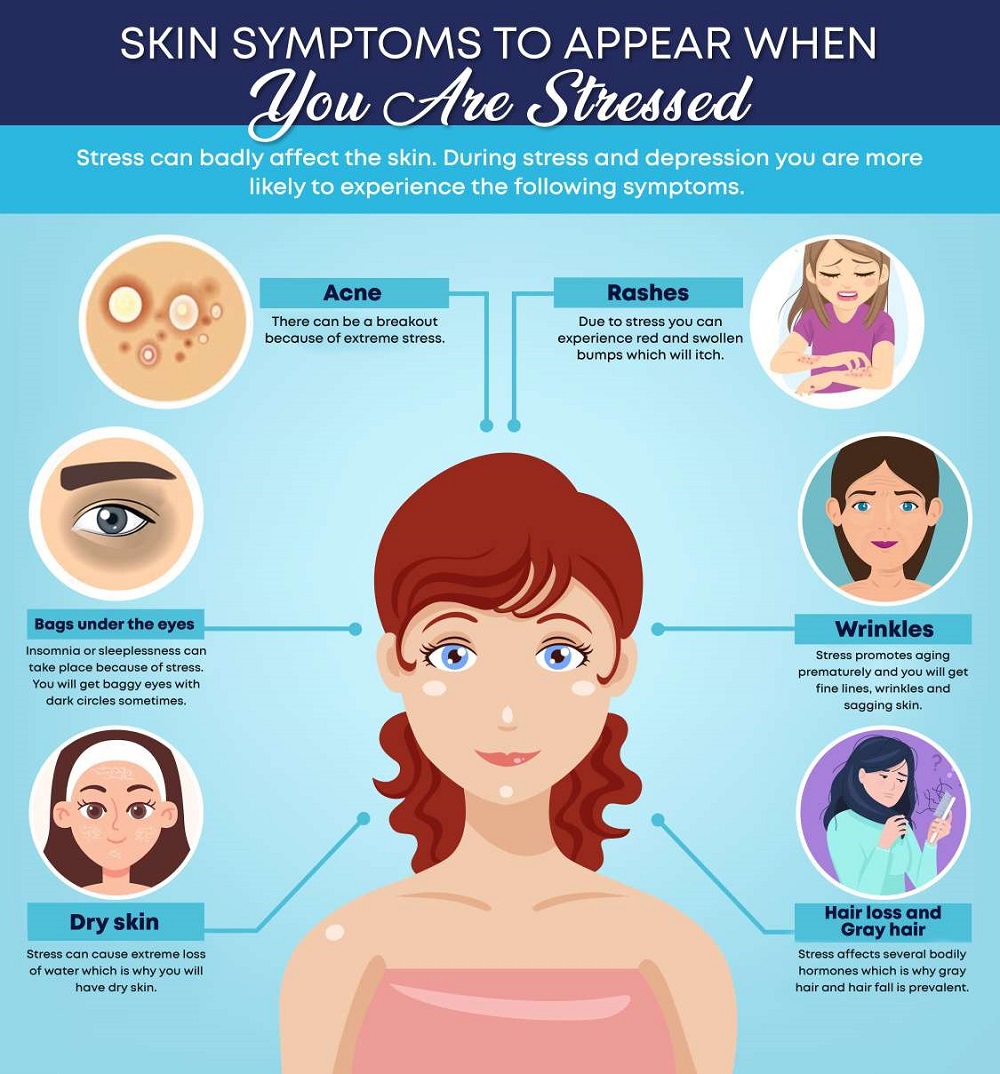
Every person experiences stress several times in the entire lifetime. When it becomes chronic this will leave severe consequences on the health like depression, weak immune system and risk of cardiovascular disease. Also, we discussed about other affects of stress on body in our previous blog.
Apart from internal health, stress badly affects the skin and face. Acne, wrinkles and dry skin are some ways it can leave its impact. Surely, your skin, face and hair are going to age prematurely if you have stress and depression. Here, we have discussed about effects on skin from stress and how to deal with it effectively. Also you can know about correct techniques of stress management.
Stress results in chemical response which in turn makes the skin highly reactive and sensitive. At that time, skin problem doesn’t heal up easily. If you get acne, stress will make a breakout. This is so; because stress promotes the secretion of cortisol hormone that directs the skin glands to secrete more oil and sebum. Hence, your skin becomes vulnerable to several skin problems including acne.
Eczema can easily flare up due to excessive stress. Itching is the most common habit of the people with stress. Such vigorous scratching will worsen down the existing patches. Sometimes, this condition itself called as itch-scratch cycle. It is said that stress impacts the sensory nerves which in turn will affect the immune and inflammatory responses of the body. Hence, stress can easily trigger eczema and makes itch-scratch cycle irregular. .
Stress cannot lead to acne but if you are vulnerable to acne then anxiety can flare it up. Stress makes an upsurge of cortisol amount which is responsible for increasing the testosterone amount in body. This hormone is the key reason behind the blocks in sebaceous glands. So, it is natural to get a spot.
Similar to eczema and acne, stress results in flaring up of the psoriasis. Stress enables the body to secrete chemicals that will promote the response of body to inflammation. So, psoriasis can flare up in the identical way.
There is enough evidence that stress flares up rosacea. In fact most people with rosacea experience worsening of the symptoms because of emotional breakdown. During stress, the face starts flushing or becomes clammy and hot.
Chronic stress becomes prominent in the face. Not only, it starts premature biological aging but you will also start experiencing sudden negative impacts on the skin. Moreover, physiological change from stress badly affects the skin. Moreover, stress can lead to several bad habits like lips biting and teeth grinding.

Check here how specifically stress affects the face:
When a person is stressed out, the body secretes more cortisol hormone. It enables the brain part, hypothalamus to secrete hormone called CRH (corticotrophin-releasing hormone). CRH is solely responsible for oil stimulation from sebaceous glands around hair follicles. Remember extra secretion will clog the pores resulting in acne breakout.
Although everyone thinks that stress leads to acne there is not enough support to this context. When a study tries to find out the triggering factor of acne menstruation, drinking alcohol, sleep deprivation and stress come out as major one.
Baggy eyes often accompany by puffiness and swelling under the eyelids. This is a common sign of aging as the supportive muscles around the eyes become weak. Sagging skin because of elasticity loss leads to baggy eyes too.
Sometimes, you develop stress from sleep deprivation. Unfortunately, it leads to premature biological aging of the skin and you will start getting several signs like uneven pigmentation, less elasticity and fine lines. Due to loss of skin elasticity bags under the eyes are more likely to develop early.
The outermost layer of skin is stratum corneum and it is full of lipids and proteins. These are essential to retain the moisture and hydration of the skin. It serves as barrier for protecting the skin beneath from foreign and harmful external substances. If stratum corneum cannot work properly then the skin becomes itchy and dry.
Stress can completely impair the ability of stratum corneum to function. So it will impact the retention ability of skin water too. Even it can slow down the self-healing ability of the skin.
Stress can badly affect the immune system lowering it down dramatically. Weak immune system causes bacterial imbalance in the skin and gut referring to the condition called dysbiosis. With the imbalance on the skin you can experience skin redness and rash. Stress is popular for aggravating certain conditions which lead to inflamed skin like contact dermatitis, eczema and psoriasis.
Stress changes the skin protein lowering its elasticity. As a result, you will start getting wrinkles and fine lines. Stress causes repetitive brow furrows which can become wrinkles with time.
Stress can make the hair gray. When you are stressed the melanocytes cells secrete a pigment namely melanin which retains the natural colour of the hair. Stress results in sympathetic nervous activity that makes melanocytes disappear.
After that, the cells become gray because of losing its natural colour. The growing cycle of the hair also disrupts from chronic stress leading to the condition known as telogen effluvium. You are more likely to experience maximum hair fall at that time.
Other ways by which stress affects the face are in the following:
Stress results in short-term skin reaction. When you are highly stressed then you will start feeling hot and uncomfortable. Sometimes, it is likely to develop raised, red itchy rash called hives.
Moreover, stress acts as a trigger for several kinds of hair loss like alopecia areata or telogan effluvium. Small evidence is notable that stressful events lead to vitiligo too in which pale patches will develop on your skin.
Basically, there is no way to resist the stress from affecting the skin and other body parts. However, you can deal the stress better to manage the symptoms of the skin condition.
When it comes to stress there are two ways for dealing with it:
If possible, look for the external pressures and control them. When there is tough thing at work you need to discuss about it with the manager so that the workload can be halved. If there is any financial problem then talk to your financial advisor.
On the other hand, emotional resilience development comprises of making time for one and stays positive. You must understand and clear about the needs as well. Remember, stress management can involve counselling, therapy and stress-relieving techniques.
Here are some proven ways to deal with stress:

While you are stressed out skin care becomes more important. Often people avoid doing it at that time. You can make these approaches to keep the skin healthy and glowing:
Skin condition management is not limited to physical symptoms treatment only. It is also about looking for the ways to deal with the issue emotionally. Several conditions such as vitiligo, rosacea, psoriasis, eczema and acne result in emotional stress that will worsen down the symptoms you are experiencing.
If things worsen down with time and you are not able to manage them then it is important to visit a skin specialist or dermatologist. Remember, they have the experience to understand the root cause of the problem and treat accordingly. In the meantime, you must consult with a psychiatrist to know the tricks for proper stress management.